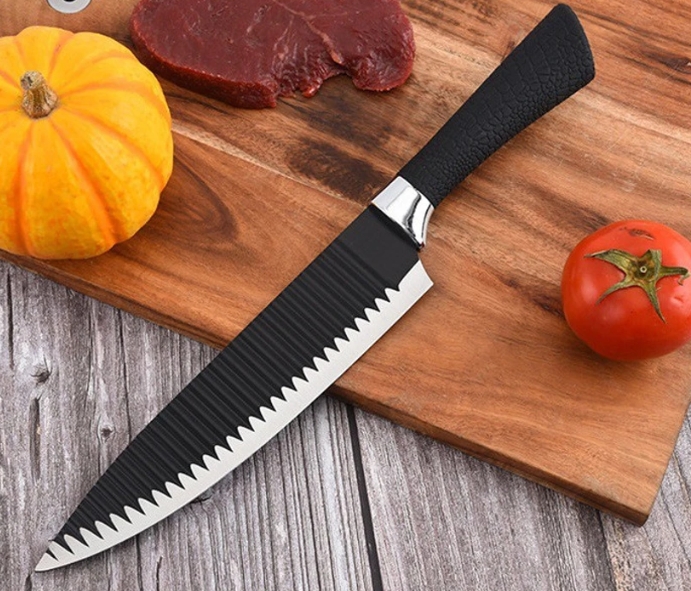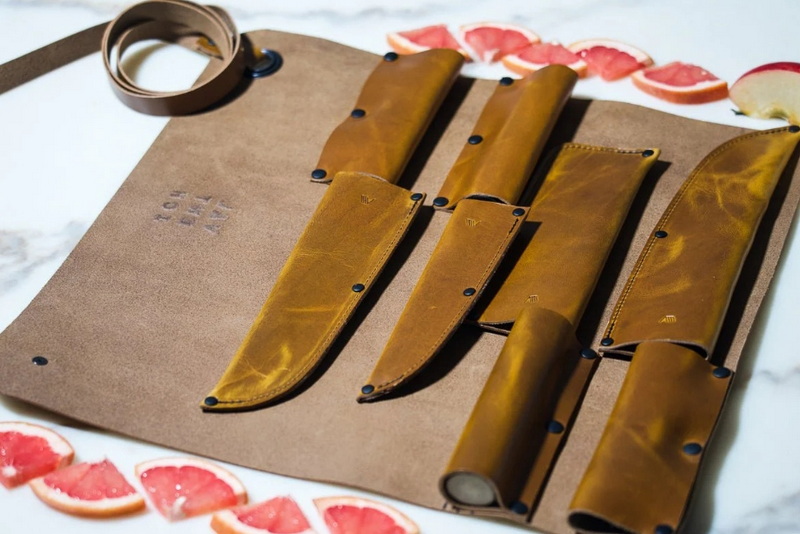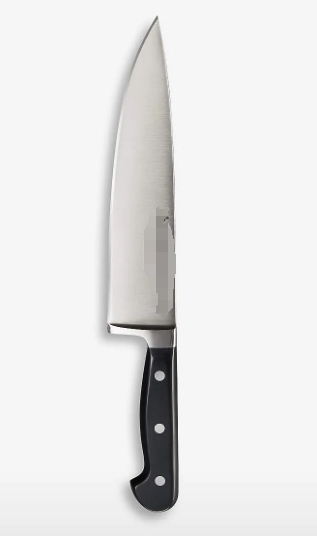

Views: 222 Author: Ella Publish Time: 2025-04-17 Origin: Site








Content Menu
● Buying Guide: How to Choose the Best Chef Knife
>> Handle Materials and Ergonomics
>> What to Look for as a Home Cook
● History and Evolution of Chef Knives
>> Differences Between Japanese and Western Styles
● Top 10 Chef Knives for Home Cooks in 2025
>> 1. Wüsthof Classic 8-Inch Chef's Knife
>> 2. Shun Classic 8-Inch Chef's Knife
>> 3. Victorinox Fibrox Pro 8-Inch Chef's Knife
>> 4. Mac Professional Series 8-Inch Chef's Knife
>> 5. Miyabi Birchwood 8-Inch Chef's Knife
>> 7. Paudin 8-Inch Chef Knife
>> 8. Mercer Culinary 8-Inch Forged Chef's Knife
>> 9. Tojiro F-808 8-Inch Chef's Knife
● Comparison Table of the Top 10 Chef Knives
>> Safety Tips
● Common Mistakes to Avoid When Using Chef Knives
● Environmental Impact and Sustainability
● Frequently Asked Questions (FAQ)
>> 1. What size chef's knife is best for home cooks?
>> 2. How often should I sharpen my chef's knife?
>> 3. Are Japanese or Western chef knives better?
>> 4. Can I put my chef's knife in the dishwasher?
>> 5. What is the difference between honing and sharpening?
A chef's knife is the cornerstone of any kitchen, whether you're a professional chef or a passionate home cook. In 2025, the market offers a wide range of chef knives tailored to different needs, preferences, and budgets. Choosing the right chef's knife can transform your cooking experience, making prep work faster, safer, and more enjoyable. This comprehensive guide explores the top 10 chef knives for home cooks in 2025, highlighting their features, pros, cons, and ideal uses. Alongside detailed descriptions, you'll find images and videos to help you visualize and understand each knife's performance.

Choosing the right chef knife is essential for efficient, safe, and enjoyable cooking. Here are the key factors to consider:
- High-Carbon Stainless Steel: Offers a perfect balance of sharpness, corrosion resistance, and durability. Most top chef knives use this material.
- VG-10 Steel: A premium Japanese steel known for excellent edge retention and sharpness.
- Damascus Steel: Not a steel type but a layered forging technique that adds beauty and strength.
- Powdered Steel (e.g., SG2): High-end steel with superior hardness and edge retention but requires careful maintenance.
- Wood Handles: Offer traditional aesthetics and comfort but require more care.
- Pakkawood: A composite wood resin that is durable and water-resistant.
- Polypropylene or Fiberglass: Durable, easy to clean, and slip-resistant.
- Stainless Steel: Sleek and hygienic but can be slippery and cold to hold.
- A well-balanced knife feels comfortable and reduces fatigue.
- Weight preference varies: some prefer heavier knives for power, others lighter for precision.
- Common blade lengths for home cooks are 6 to 8 inches, with 8 inches being the most versatile.
- Budget knives can be found under $50 but may lack longevity.
- Mid-range knives ($100-$200) often provide excellent performance and durability.
- Premium knives ($300+) offer craftsmanship, superior materials, and aesthetics.
- Comfort and grip safety.
- Versatility for chopping, slicing, dicing.
- Ease of maintenance.
- Durability and warranty.
The chef's knife has evolved over centuries to meet the demands of cooks worldwide.
- The modern chef knife descends from the French "couteau de chef" designed for versatility.
- Early knives were simple, heavy, and made from carbon steel.
| Feature | Japanese Knives | Western Knives |
|---|---|---|
| Blade Thickness | Thinner, sharper edge | Thicker, more durable edge |
| Steel Hardness | Harder steel, holds edge longer | Softer steel, easier to sharpen |
| Cutting Style | Precision slicing, push cuts | Rocking motion, chopping |
| Handle Design | Often wooden, octagonal or D-shaped | Ergonomic, full tang with rivets |
- Damascus layering for strength and beauty.
- Advanced steel alloys for better edge retention.
- Ergonomic handle designs for comfort.
- Seamless, hygienic one-piece designs.
Made in Germany, this knife features a full tang and triple-riveted handle for durability and balance. The blade uses Precision Edge Technology (PEtec) for superior sharpness.
- Use-case: Great for chopping vegetables, slicing meats, and mincing herbs.
- User testimonial: "The Wüsthof Classic feels solid in my hand and stays sharp for weeks. It's my go-to knife for everything." — Emily R., home cook.
A Japanese knife with VG-MAX steel core and 69-layer Damascus cladding, combining beauty and precision.
- Use-case: Best for delicate slicing and fine cuts.
- Expert opinion: Chef Takashi says, "Shun knives offer unmatched precision, perfect for intricate prep work."
Affordable Swiss knife with a slip-resistant handle and sharp stainless steel blade.
- Use-case: Everyday kitchen tasks, especially for beginners.
- User testimonial: "Great value for the price, very comfortable and sharp." — Mark D.
Balances Japanese sharpness and Western versatility with a thin, razor-sharp blade.
- Use-case: Versatile for chopping, slicing, and dicing.
- Expert opinion: Culinary instructor Lisa notes, "Mac knives offer excellent control and edge retention."
Premium Japanese knife with SG2 micro-carbide powder steel core and birchwood handle.
- Use-case: For cooks who want both performance and artistry.
- User testimonial: "A beautiful knife that performs like a dream." — Sophia L.
All-steel, lightweight knife made from CROMOVA 18 stainless steel.
- Use-case: Ideal for cooks who prefer a lighter blade.
- Expert opinion: "Global knives are hygienic and easy to maneuver," says Chef Marco.
German steel blade with ergonomic pakkawood handle.
- Use-case: Versatile and stylish for everyday use.
- User testimonial: "Comfortable grip and sharp edge make it a pleasure to use." — Jamie K.
Professional-grade, budget-friendly forged knife.
- Use-case: Heavy-duty kitchen tasks.
- User testimonial: "Sturdy and sharp, great for tough chopping." — Daniel M.
Affordable Japanese knife with VG-10 steel core.
- Use-case: Entry-level Japanese knife for home cooks.
- Expert opinion: "Excellent sharpness for the price." — Chef Naomi.
High-carbon German steel with ergonomic handle and stylish design.
- Use-case: For cooks who want aesthetics and performance.
- User testimonial: "Sharp, durable, and looks great on my countertop." — Alex P.

| Knife | Blade Material | Length | Weight | Price Range | Pros | Cons |
|---|---|---|---|---|---|---|
| Wüsthof Classic | High-carbon stainless steel | 8" | ~7 oz | $150-$200 | Durable, balanced, sharp | Heavy for some |
| Shun Classic | VG-MAX steel + Damascus | 8" | Moderate | $160-$225 | Sharp, beautiful, lightweight | Fragile, needs care |
| Victorinox Fibrox Pro | Stainless steel | 8" | Light | $45-$60 | Affordable, versatile | Less balanced |
| Mac Professional | High-carbon stainless steel | 8" | Moderate | $170-$200 | Sharp, agile | Needs frequent honing |
| Miyabi Birchwood | SG2 powder steel + Damascus | 8" | Heavy | $300-$400 | Sharp, artistic, ergonomic | Expensive, delicate |
| Global G-2 | CROMOVA 18 stainless steel | 8" | Very light | $120-$150 | Lightweight, hygienic | Handle not for all |
| Paudin | German high-carbon steel | 8" | Balanced | $80-$120 | Comfortable, stylish | New brand |
| Mercer Culinary | High-carbon stainless steel | 8" | Heavy | $40-$70 | Durable, budget-friendly | Heavy, less ergonomic |
| Tojiro F-808 | VG-10 steel | 8" | Light | $100-$130 | Sharp, affordable | Basic handle |
| Dalstrong | High-carbon German steel | 8" | Moderate | $100-$180 | Sharp, stylish | Pricey for some |
Proper care extends the life and performance of your chef knife.
- Honing: Realigns the blade edge; should be done weekly using a honing rod.
- Sharpening: Removes metal to create a new edge; done every few months or when dull.
- Use whetstones, electric sharpeners, or professional services.
- Hand wash knives immediately after use with mild soap.
- Avoid dishwashers to prevent corrosion and handle damage.
- Dry thoroughly before storing.
- Store in knife blocks, magnetic strips, or blade guards to protect edges and prevent accidents.
- Always cut on a stable surface like a wooden or plastic cutting board.
- Use proper grip and cutting techniques to avoid injury.
- Keep knives out of reach of children.
- Improper Cutting Techniques: Avoid using excessive force or twisting the blade.
- Poor Maintenance Habits: Neglecting sharpening and honing dulls the blade quickly.
- Unsafe Storage: Throwing knives in drawers can damage edges and cause accidents.
- Using the Wrong Knife for the Task: Use a chef knife for general tasks, but specialized knives for filleting or bread cutting.
- Manual whetstones offer precise sharpening.
- Electric sharpeners are convenient but can remove too much metal.
- Honing rods maintain edges between sharpenings.
- Wooden or plastic boards are ideal; avoid glass or stone which dull blades.
- Larger boards provide more workspace and safety.
- Knife blocks protect blades and keep knives accessible.
- Magnetic strips save counter space and display knives.
- Blade guards are useful for drawer storage and travel.
- Materials Sourcing: Sustainable steel production reduces environmental footprint.
- Longevity: Investing in high-quality knives reduces waste by lasting decades.
- Recycling: Some manufacturers offer recycling programs for old knives.
- Eco-Friendly Handles: Materials like stabilized wood and recycled composites are gaining popularity.
Selecting the best chef knife for home cooking in 2025 depends on your personal preferences, budget, and cooking style. Whether you prioritize durability, sharpness, aesthetics, or affordability, there is a knife in this list that will elevate your kitchen experience. Investing in a quality chef's knife will save you time and effort, making food preparation more enjoyable and precise. Remember to maintain your knife with proper sharpening and care to ensure it lasts a lifetime.

Most home cooks find an 8-inch blade ideal because it balances control and versatility for a wide range of kitchen tasks.
Sharpening frequency depends on use, but generally, honing should be done weekly, and sharpening every few months or when the blade dulls noticeably.
Japanese knives tend to be lighter and sharper with thinner blades, ideal for precision. Western knives are heavier and more durable, better for tougher tasks.
It is best to hand-wash chef knives to maintain their sharpness and prevent corrosion or damage to the handle.
Honing realigns the blade's edge and should be done regularly. Sharpening removes metal to create a new edge and is needed less often.
[1] https://www.seriouseats.com/the-best-chefs-knives
[2] https://www.youtube.com/watch?v=ziZE7dApCmw
[3] https://www.goodhousekeeping.com/cooking-tools/best-kitchen-knives/g646/best-kitchen-cutlery/
[4] https://www.techgearlab.com/topics/kitchen/best-chef-knife
[5] https://www.youtube.com/watch?v=SNSsXZRrXS8
[6] https://www.sharpenright.com/post/the-best-chef-knives-of-2025-a-guide-to-precision-and-performance
[7] https://www.nytimes.com/wirecutter/reviews/the-best-chefs-knife-for-most-cooks/
[8] https://www.foodnetwork.com/how-to/packages/shopping/product-reviews/best-chefs-knife
[9] https://www.youtube.com/watch?v=BPkUlnYwigo
[10] https://paudinstore.com/nl/blogs/news/top-rated-knives-for-home-chefs-2025-rankings-reviews
[11] https://paudinstore.com/blogs/news/top-rated-knives-for-home-chefs-2025-rankings-reviews
[12] https://www.thespruceeats.com/best-japanese-knives-4178850
[13] https://nymag.com/strategist/article/best-kitchen-knife-sets.html
[14] https://www.foodandwine.com/lifestyle/kitchen/best-chefs-knife
[15] https://www.tasteofhome.com/collection/best-kitchen-knife-sets/
[16] https://www.yahoo.com/lifestyle/best-chef-knife-174111645.html
[17] https://nymag.com/strategist/article/best-chefs-knives.html
[18] https://www.thegentlemansjournal.com/article/best-kitchen-knives/
[19] https://www.nytimes.com/wirecutter/reviews/the-best-chefs-knife-for-most-cooks/
[20] https://www.youtube.com/watch?v=9SivPW5kR9U
[21] https://enhancv.com/resume-examples/chef/
[22] https://www.myperfectresume.com/resume/examples/culinary/chef